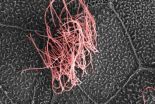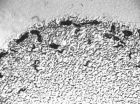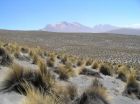New species of tiny frog is world's smallest vertebrate
2012-01-13
(Press-News.org) Researchers have found two new frog species in New Guinea, one of which is the new smallest known vertebrate on Earth. The results are reported in the Jan. 11 issue of the online journal PLoS ONE, and the team of researchers was led by Christopher Austin of Louisiana State University.
The new smallest vertebrate species is called Paedophryne amauensis, named after Amau Village in Papua New Guinea, where it was found. The adult body size for these frogs ranges from just 7.0 to 8.0 millimeters.
According to Dr. Austin, the discovery "is of considerable interest to biologists because little is understood about the functional constraints that come with extreme body size, whether large or small". The previous smallest vertebrate was a fish, called Paedocypris progenetica, with an adult size of 7.9 to 10.3 millimeters.
INFORMATION:
Citation: Rittmeyer EN, Allison A, Gru¨ ndler MC, Thompson DK, Austin CC (2012) Ecological Guild Evolution and the Discovery of the World's Smallest Vertebrate. PLoS ONE 7(1): e29797. doi:10.1371/journal.pone.0029797
Financial Disclosure: This research was funded by National Science Foundation grants DEB 0103794 and DEB 0743890 to AA and DEB 0445213 and DBI 0400797 to CCA. The funders had no role in study design, data collection and analysis, decision to publish, or preparation of the manuscript.
Competing Interest Statement: The authors have declared that no competing interests exist.
Disclaimer: This press release refers to upcoming articles in PLoS ONE. The releases have been provided by the article authors and/or journal staff. Any opinions expressed in these are the personal views of the contributors, and do not necessarily represent the views or policies of PLoS. PLoS expressly disclaims any and all warranties and liability in connection with the information found in the release and article and your use of such information.
About PLoS ONE
PLoS ONE is the first journal of primary research from all areas of science to employ a combination of peer review and post-publication rating and commenting, to maximize the impact of every report it publishes. PLoS ONE is published by the Public Library of Science (PLoS), the open-access publisher whose goal is to make the world's scientific and medical literature a public resource.
All works published in PLoS ONE are Open Access. Everything is immediately available—to read, download, redistribute, include in databases and otherwise use—without cost to anyone, anywhere, subject only to the condition that the original authors and source are properly attributed. For more information about PLoS ONE relevant to journalists, bloggers and press officers, including details of our press release process and our embargo policy, see the everyONE blog at http://everyone.plos.org/media.
END
ELSE PRESS RELEASES FROM THIS DATE:
2012-01-13
Brain cancer cells are particularly resistant to chemotherapy — toxins enter the cells, but before the toxins can kill, cancer cells quickly pump them back outside. In fact, brain cancer cells are even better than healthy cells at cleaning themselves. This means that when hit with chemotherapy, healthy cells tend to die before brain cancer cells. Especially in the brain, killing healthy cells is bad.
Researchers at the University of Colorado Cancer Center have discovered a way to turn off the pumps — only in brain cancer cells and not in their healthy neighbors. Promising ...
2012-01-13
Iron is a popular topic in health news. Doctors prescribe it for medical reasons, and it's available over the counter as a dietary supplement. And while it's known that too little iron can result in cognitive problems, it's also known that too much promotes neurodegenerative diseases.
Now, researchers at UCLA have found that in addition to causing cognitive problems, a lack of iron early in life can affect the brain's physical structure as well.
UCLA neurology professor Paul Thompson and his colleagues measured levels of transferrin, a protein that transports iron ...
2012-01-13
La Jolla ---- Scientists at the Salk Institute for Biological Studies have identified a gene that tells cells to develop multiple cilia, tiny hair-like structures that move fluids through the lungs and brain. The finding may help scientists generate new therapies that use stem cells to replace damaged tissues in the lung and other organs.
"Cells with multiple cilia play a number of important roles, including moving fluids through the respiratory tract, brain and spinal cord," says Christopher R. Kintner, a professor in Salk's Molecular Neurobiology Laboratory, who led ...
2012-01-13
PASADENA, Calif.— Scientists have long seen evidence of social behavior among many species of animals, both on the earth and in the sea. Dolphins frolic together, lions live in packs, and hornets construct nests that can house a large number of the insects. And, right under our feet, it appears that nematodes—also known as roundworms—are having their own little gatherings in the soil. Until recently, it was unknown how the worms communicate to one another when it's time to come together. Now, however, researchers from the California Institute of Technology (Caltech) and ...
2012-01-13
Sufferers of smoking related lung diseases could have their debilitating symptoms reduced following the discovery of a potential new treatment.
The discovery, by researchers at the University of Melbourne, Royal Melbourne Hospital, Australia, and the Brigham and Women's Hospital, Harvard Medical School, US, could dramatically improve treatments and slow the progression of COPD (Chronic Obstructive Pulmonary Disease) which includes the incurable condition emphysema.
COPD is a progressive disease that makes it hard to breathe and is mostly caused by excessive smoking. ...
2012-01-13
FRESNO, Calif. – Can eating grapes slow or help prevent the onset of age-related macular degeneration (AMD), a debilitating condition affecting millions of elderly people worldwide? Results from a new study published in Free Radical Biology and Medicine suggest this might be the case. The antioxidant actions of grapes are believed to be responsible for these protective effects.
The study compared the impact of an antioxidant-rich diet on vision using mice prone to developing retinal damage in old age in much the same way as humans do. Mice either received a grape-enriched ...
2012-01-13
Fungi may be unexpected allies in our efforts to keep hazardous lead under control. That's based on the unexpected discovery that fungi can transform lead into its most stable mineral form. The findings reported online on January 12 in Current Biology, a Cell Press publication, suggest that this interaction between fungi and lead may be occurring in nature anywhere the two are found together. It also suggests that the introduction or encouragement of fungi may be a useful treatment strategy for lead-polluted sites.
"Lead is usually regarded as a pretty stable substance," ...
2012-01-13
CHESTNUT HILL, MA (Jan. 12, 2012) – Researchers from Boston College have discovered a protein that plays a pivotal role in the progression of the deadly diseases toxoplasmosis and malaria and shown that its function could be genetically blocked in order to halt the progress of the parasite-borne illnesses, the team reports in the current edition of the journal Science.
The protein, identified as DOC2.1, plays a similar role in the secretion of microneme organelles that are crucial to the mobility of the parasitic protozoa Toxoplasma gondii, which causes toxoplasmosis, ...
2012-01-13
Preserving diverse plant life will be crucial to buffer the negative effects of climate change and desertification in in the world's drylands, according to a new landmark study.
The findings of the multi-author study, published today in the journal Science, are based on samples of ecosystems in every continent except Antarctica.
They confirm for the first time that the more diverse an ecosystem is, the more ecological functions it performs. It also has implications for carbon sequestration and soil health.
"This is the most extensive study of the links between function ...
2012-01-13
Land areas that are a priority for wildlife conservation provide relatively high levels of ecosystem services such as pollination, water purification, food production, and climate regulation, so safeguarding them is expected to benefit people. Assessing these benefits to populations in ways that are useful to decisionmakers who guide conservation efforts has, however, proved difficult.
A global analysis published in the January 2012 issue of BioScience by Will R. Turner of Conservation International and his colleagues breaks new ground by analyzing the flow of benefits ...
LAST 30 PRESS RELEASES:
[Press-News.org] New species of tiny frog is world's smallest vertebrate


